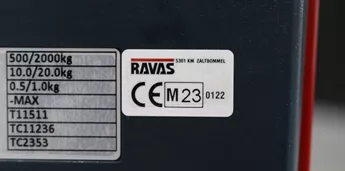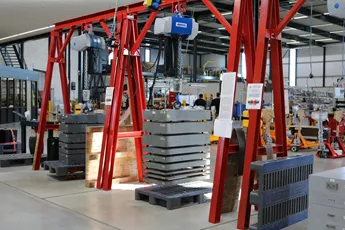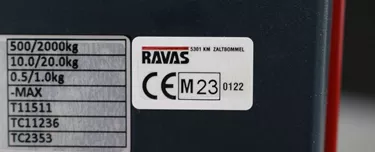To be able and allowed to invoice by weight, the weighing system you use must be a Legal for Trade weighing system. In popular speech, people often talk about calibrating a weighing system, but in relation to invoicing based on weight we talk about verifications.
To ensure that everyone applies the same rules when inspecting a scale, the OIML International Organisation of Legal Metrology) provides unambiguous regulations around weighing.
Requirements for a verified weighing system
All makes and models of warehouse trucks and forklifts can be equipped with a Legal for Trade mobile weighing system. There are also several models of pallet trucks available that already have a verified weighing system suitable for weight-based invoicing.
It is important that the components of the weighing system, such as the indicator and load cells, as well as the complete assembled system, meet various requirements. If you opt for a RAVAS pallet truck then this is obviously the case but for your other brands of warehouse trucks and forklift trucks this will not pose any problems in almost all cases.
The NMi takes care of the certification of these components. Components are tested for all kinds of things, such as operating under varying temperatures, electromagnetic radiation, security and, of course, how accurately the components react. In addition, every Legal for Trade weighing system includes a level switch that switches off the display if the scale tilts more than two degrees. This is to prevent weighing errors. And furthermore, the weight weighed must be directly readable by the operator from a display.
Inspection of your weighing system
Verifying a weighing system for Legal for Trade is checking and, if necessary, adjusting a system. Using weights, we determine the accuracy of the weighing system and reveal any discrepancies. Any discrepancies are adjusted so that the system again meets the standard.
Every verified weighing system is tested according to standards laid down in OIML legislation, and delivered with a certificate. This certificate states, among other things, the name of the manufacturer, the product, the serial number, the approval number under which the product was certified, the standards according to which the weighing system was checked and stamped, and the gravity factor with which the initial check was carried out.
Blog: Why you want to invoice customers based on weighted weight
Have you ever thought about mobile weighing to optimise your logistics processes? Thanks to our solutions, you are not only flexible in your controls. RAVAS also enables you to save time and money by invoicing your customers based on weight thanks to our Legal for Trade solutions.
)
How do you recognize a calibrated weighing system?
You can recognize a 'Legal for Trade' weighing system by the sticker provided for this purpose. The example shows
- The name of the company performing the inspection, including postcode and city
- CE, M, the year of introduction (17)
- 0122, the number of the Notified Body

How often should a legal for trade weighing system be checked?
Government agencies check that weighing systems used to invoice customers by weight meet legally required accuracy standards. The inspectors usually visit unannounced and it is your responsibility as a user to ensure that your scales remain within the required accuracy. Each country has different rules but an annual check is always recommended. Ideally, we schedule a re-inspection at the same time as other maintenance on the weighing systems. This way, you have minimal inconvenience from both maintenance and the re-inspection. Would you like to make an appointment for maintenance and/or a re-inspection of your system? Please contact our Service colleagues. The rules for verifying a legal for trade weighing system differ per country.
For example:
- Netherlands: not required by law
- US: Annual
- France: Annual
- Spain: every 2 years
- Germany: every 2 years
- Italy: every 3 years
Such verification should only be carried out by a representative of a certified metrological institute. This can be done by a RAVAS representative or by another certified organisation. RAVAS is certified by the NMi (Dutch Metrology Institute) to carry out initial verifications and inspections of legal weighing systems, in accordance with Council Directives 90/384/EEC and 93/86/EEC on non-automatic weighing systems and Module D of Council Decision 93/465/EEC.
Weight-based invoicing with your existing trucks
Almost all our mobile weighing systems are applicable to all makes and models of warehouse trucks and forklift trucks. Would you like to purchase a verified weighing hand pallet truck? Or are you interested in the possibility of verifying and wondering whether your current fleet can be equipped with a legal for trade mobile weighing system? Then contact our experts. This will put weight-based invoicing within reach for you, too.

Want to know more about weight-based invoicing?
We will be happy to tell you about the application of Legal for Trade to our mobile weighing systems and the additional benefits.

Abdel Kerkri
Contact us
Want to know more about weight-based invoicing?
We will be happy to tell you about the application of Legal for Trade to our mobile weighing systems and the additional benefits.
We will be happy to tell you about the application of Legal for Trade and the additional benefits.

Want to know more?
We will be happy to tell you about the application of Legal for Trade and the additional benefits.
Learn more about our Mobile Weighing technology through our blogs
Through blogs, videos and other items, discover how a mobile weighing system can make your processes more efficient and cost-effective, generate management information, monitor the quality of your products and services and promote customer satisfaction.











